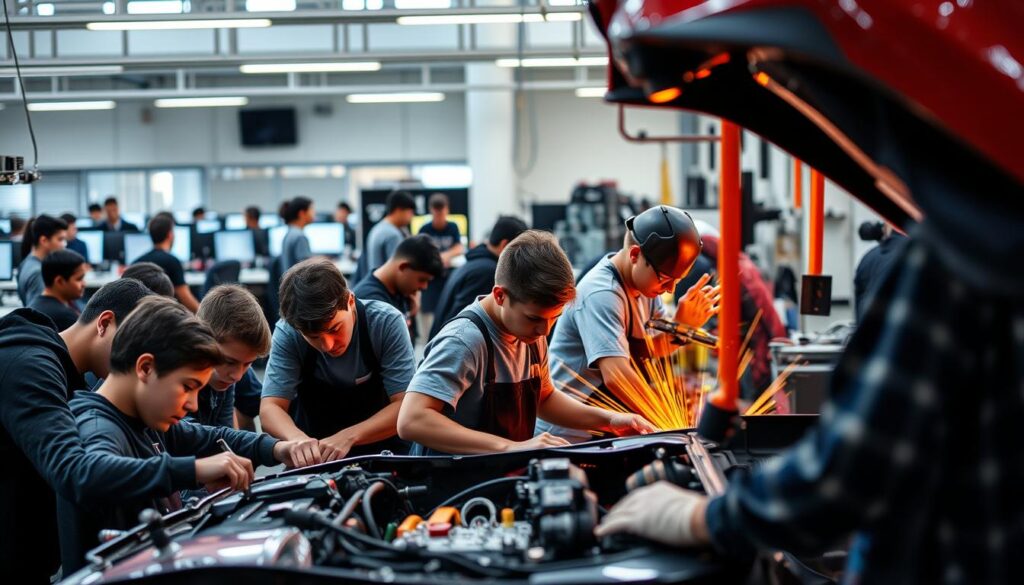As a parent, you want the best for your teen’s future. This includes making informed decisions about their education and career. The college vs. vocational training debate can be overwhelming. How can you support your teen in making this critical decision?
It’s important to understand the education landscape and options available to teens. This includes college and vocational training. These choices are not just about education. They also impact career pathways and opportunities. You have a big role in guiding your teen through this process. It’s key to consider their interests, strengths, and goals when exploring different education options.
Key Takeaways
- College and vocational training are two distinct education paths with different benefits and outcomes.
- Understanding your teen’s interests, strengths, and career goals is key in making an informed decision.
- The current education landscape offers a range of options, including college and vocational training programs.
- Career pathways and opportunities vary depending on the type of education and training chosen.
- As a parent, you play a significant role in guiding your teen through the decision-making process.
- Considering factors such as teen education and career pathways is essential in helping your teen make the right choice.
- Exploring college vs. vocational training options can help your teen find the best fit for their future.
Understanding the Modern Education Landscape
When you think about your future in higher education, it’s key to know the current scene. The job world is changing fast, and old ideas about school are fading. New tech and industries mean more jobs need skilled people. That’s why choosing the right path is so important, and guidance can help.
The education world is moving towards focusing more on careers. Many students choose vocational training to get ready for their jobs. This shift helps workers keep up with the job market’s changes. Think about what you’re good at, what you like, and what you want to achieve in your career to pick the best path.
When looking at higher education, consider a few things:
- Academic programs and courses
- Career development opportunities
- Industry partnerships and collaborations
- Support services and resources
By doing your homework and comparing options, you can choose wisely for your future. Remember, there’s help available to guide you. Don’t hesitate to ask for advice and support as you decide.
The Complete Guide to College Education
Thinking about college? It’s key to prepare well. This means researching colleges, understanding their programs, and meeting their requirements.
For teens, planning your career is just as important. You should match your college education with your career dreams. This means exploring different fields and understanding the job market.
Here are some important things to think about in college prep and career planning:
- Academic strengths and weaknesses
- Career interests and goals
- College programs and courses
- Financial aid and scholarships
By considering these points, you can make a smart choice about college. This sets you up for success in your future career.

Exploring Vocational Training Programs
Vocational training programs are worth looking into for your education and career. They mix hands-on training with theoretical knowledge. This prepares you for a specific career path. These programs give you the skills and knowledge needed to succeed in your field.
Vocational training leads to many career paths, like technical, trade, and service industries. You can get certifications in areas like automotive repair, culinary arts, and healthcare technology. These programs are shorter than college, lasting from months to two years. They often include internships or apprenticeships for practical experience.
Here are some key benefits of vocational training programs:
- Hands-on training and practical experience
- Shorter duration and lower costs compared to traditional college degrees
- Specialized skills and knowledge for a specific career pathway
- Opportunities for internships and apprenticeships

When picking a vocational program, think about the time and commitment needed. Some are full-time, others part-time or online. It’s important to research and choose the best fit for your needs and goals. Exploring vocational training can help you gain the skills and knowledge for your chosen career and long-term goals.
| Program | Duration | Career Pathway |
|---|---|---|
| Automotive Repair | 1-2 years | Automotive Technician |
| Culinary Arts | 6-12 months | Chef or Restaurant Manager |
| Healthcare Technology | 1-2 years | Medical Technician or Healthcare Administrator |
Financial Considerations for Both Paths
When looking at higher education options, think about the money side of things. Choosing the right path for your teen means looking at the costs of college and vocational training. With the right educational guidance, you can help your teen pick a path that fits their career dreams and budget.
Here are some key factors to consider:
- College tuition and fees: These can vary a lot, depending on the school and where it’s located.
- Vocational training costs: These might be less than college, but they’re not cheap.
- Available financial aid options: There are scholarships, grants, and loans to help pay for education.
By carefully looking at these points and your teen’s strengths, interests, and career goals, you can guide them well. Don’t forget to check out financial aid options to make their choice more affordable.

Assessing Your Teen’s Interests and Abilities
When it comes to teen education, it’s key to think about your child’s interests and skills. This helps guide them in choosing the right career pathways. Start by encouraging them to think about their interests and explore different careers. Also, talk to teachers and counselors for advice.
The choice between college vs. vocational training is important. Both have their own benefits. Vocational training gives hands-on skills, while college offers more academic and social chances. Think about your teen’s strengths, weaknesses, and interests to help them choose the best path.

Some important things to consider when looking at your teen’s interests and abilities include:
- Academic performance and strengths
- Extracurricular activities and hobbies
- Personality traits and learning style
- Career goals and aspirations
By taking a detailed look at your teen’s interests and abilities, you can help them through the complex world ofteen education. This way, they can make a smart choice about their futurecareer pathways.
College vs. Vocational Training: Helping Your Teen Make the Right Choice
As a parent, guiding your teen towards the right path is key. They need to decide between college and vocational training. It’s important to think about their strengths, goals, and how they learn best.
Vocational programs focus on practical skills. They’re great for teens who learn by doing. College, on the other hand, offers a deeper understanding of subjects. It’s best for those who do well in school.

- Academic strengths: What are your teen’s academic strengths and weaknesses?
- Career goals: What are your teen’s career aspirations, and which path will help them achieve their goals?
- Personal learning style: Does your teen prefer hands-on learning or theoretical foundations?
By looking at these factors, you can guide your teen. This way, they can choose what’s best for their future. It’s all about finding the right fit for their strengths, goals, and learning style.
Time to Employment and Career Advancement
When thinking about career pathways for your teen, consider the time to employment and career growth. Look at the job prospects and career advancement in different higher education options. Guide your teen through teen career planning to weigh the benefits and drawbacks of each path.
Think about how long it takes to start working. Some vocational training leads to jobs right away. Others need more education or training. College degrees take years but can lead to better career growth.
Here are some points to consider when evaluating time to employment and career advancement:
- Job placement rates for different education paths
- Average starting salaries and long-term earning
- Opportunities for career advancement and professional development

By carefully considering these factors and exploring different career pathways, you can help your teen make an informed decision. This decision will set them up for success in their chosen field. Effective teen career planning balances short-term goals with long-term aspirations. It finds the right balance between education, training, and practical experience.
The Role of Parents in the Decision Process
As a parent, guiding your teen towards their future is key. When it comes to teen education, there are many paths to consider. This includes college and vocational training. Your role is to support and guide, helping them see the good and bad of each option.
Choosing the right path can be tough, but with your help, your teen will feel more sure. It’s important to talk openly about their interests, strengths, and career dreams. This way, you can help them find the best fit for their future.
Some key factors to consider when guiding your teen include:
- Encouraging your teen to explore their interests and passions
- Helping your teen research and understand the different education options available
- Supporting your teen in making a decision that aligns with their career goals
By being involved and guiding, you can help your teen make a choice that will lead to success. Remember, the goal is to help your teen make the right choice for their future. With your support, they can reach their goals.

Creating a Decision Timeline
Choosing between college prep and vocational programs is a big decision. It’s important to make a timeline to help you stay focused. This way, you can make sure you’re moving towards your goals.
Think about these key steps when making your timeline:
- Research different college and vocational programs to see which fit your career goals
- Talk to guidance counselors or career advisors about your options
- Look into financial aid and scholarships to fund your education
Having a timeline helps you make a better choice about your education and career. Stay true to your goals and don’t hesitate to ask for help. With careful planning, you’ll be on the path to success in your chosen field.
Supporting Your Teen’s Choice
As a parent, guiding your teen in educational guidance is key. It helps them make smart choices for their future. Supporting them in teen career planning is vital. This support boosts their confidence and motivation.
Acceptance is a big part of supporting your teen. It’s important to accept their decisions and offer making the right choice advice. Talk openly with your teen, listen to their worries, and share your wisdom.
Support your teen by researching career paths and educational options together. Discuss the value of teen career planning. Encourage them to find mentors in their field for insights and advice.
With the right support and educational guidance, your teen will make informed decisions. Be patient, understanding, and always keep communication open. This will help them succeed in their chosen career.
The goal is to help your teen make the best choice for their future. With the right support, they’ll reach their goals. Together, you can help them thrive in their career.
Conclusion: Embracing Your Teen’s Educational Journey
When deciding between college and vocational training, remember that every teen is different. They have their own strengths, interests, and dreams. It’s key to support them in choosing what’s best for their future.
Whether they choose a top university or a vocational program, the main thing is they make an informed choice. By working together, looking at career paths, and exploring options, you can help them find the right fit. This sets them up for success in the long run.
There’s no single right choice. What matters most is that your teen feels confident and excited about their future. Be open-minded and supportive as they navigate this important time in their life.
